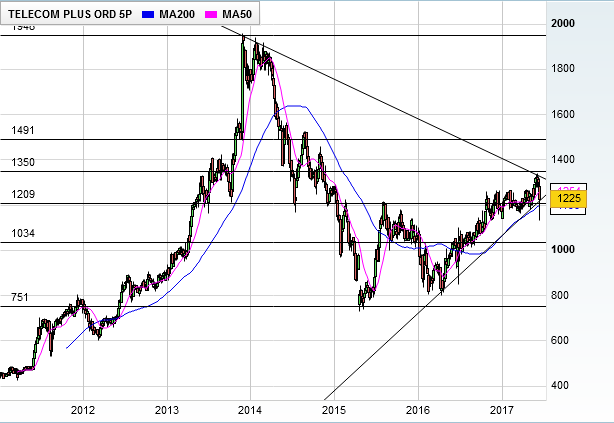Is Telecom Plus collapse an opportunity?
13th June 2017 17:17
by David Brenchley from interactive investor
There were upgrades to analyst price target for following 'in line' final results Tuesday. But that didn't stop the shares plunging as much as 13% early doors, from a two-and-a-half year high to a seven-month low.
The scale of the sell-off came as a surprise, unwinding some of that 62% gain achieved since April 2016 - Telecom Plus was an Interactive Investor Share of the week last October. Bargain hunters soon piled in, however, repairing some of the damage, but they're still at a discount to yesterday's close.
Lower energy prices clipped 0.6% off revenue in the year to 31 March 2017 to £740 million. Excluding proceeds from the £71 million December sale of a 20% stake in Opus Energy, adjusted pre-tax profit rose 9% to £53.3 million. It's likely to be similar next year.
Earnings per share (EPS) ex-Opus increased 7.2% to 53.3p, while the healthy dividend grew to 48p per share, 4.3% up year-on-year and giving a yield of 3.7%.
The Opus disposal netted Telecom Plus a cool £62.3 million in exceptional profit, boosting the balance sheet that now shows net cash of £18.7 million (net debt in 2016 was £56.3 million).
It's likely a decision to cut the size of a planned capital return from £70 million to £25 million went down badly with some shareholders.
Telecom Plus cited political, economic and regulatory uncertainty for the decision, concluding that a decent cash buffer was preferable given current threats.
"This reduces our earnings forecasts by 4%, but provides the prospect of a higher rate of return assuming an investment opportunity is forthcoming," said Peel Hunt analyst Charles Hall.
We mentioned last month that any attempt by the eventual new government - of whichever hue - to implement a price cap on standard variable tariffs (SVTs) would likely knock utilities, and the bigger players have been railing against proposals, claiming it would reduce competition and choice.
But Telecom Plus says it would welcome such a measure, noting that its wholesale arrangements, retail pricing structure and low cost base mean its profitability will be less impacted than the other major suppliers.

After coming within sight of £20, Telecom's share price unravelled over the course of 2014. A profits warning in April 2015 took the shares down to a low of 740p - meaning two-thirds of its value had been lost in less than 18 months.
But our stockpicker Edmond Jackson suggested at the end of April that year that the stock had fallen too far at just below the £8 mark - and so it proved. It had climbed to £9.53 by the end of June, and analysts were backing it up above a tenner then.
By October last year it had reached £12.60 and was described as a "must own" by some brokers. It's traded largely flat since, but had climbed to 1,342p by last Monday.
Despite today's drop, analysts are still keen on the stock, with customer sign-ups increasing and the quality of those customers also on the rise, which "bodes well for the long-term growth and cash flow", according to Hall.
He raises his target price by 5% to 1,360p - based on a price/earnings (PE) ratio of 25 times - suggesting potential upside of 11%. Andrew Darley, analyst at finnCap, also raised his price slightly, up to 1,390p, "with a commitment to 85% [dividend] payout ratio and a return to profitable growth visible on the horizon".
Its launch of Home Insurance is currently not modelled into Darley's forecasts, so the addition of that revenue potential is positive. Hall reckons that, whilst it's too early to have clarity over its potential, "it could become an important contributor to long-term growth and customer retention".
Another potential future revenue source is water - executive chairman Charles Wigoder did not hide his disappointment that deregulation of the domestic water supply market was "absent from the new government's manifesto".
This article is for information and discussion purposes only and does not form a recommendation to invest or otherwise. The value of an investment may fall. The investments referred to in this article may not be suitable for all investors, and if in doubt, an investor should seek advice from a qualified investment adviser.